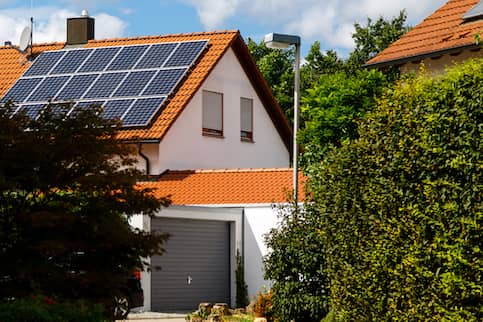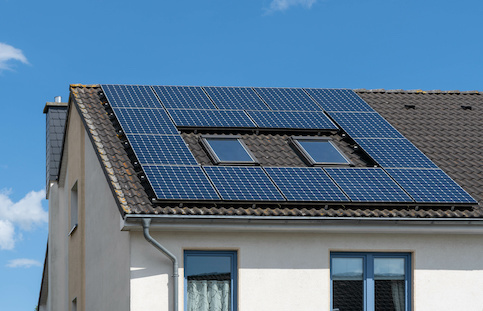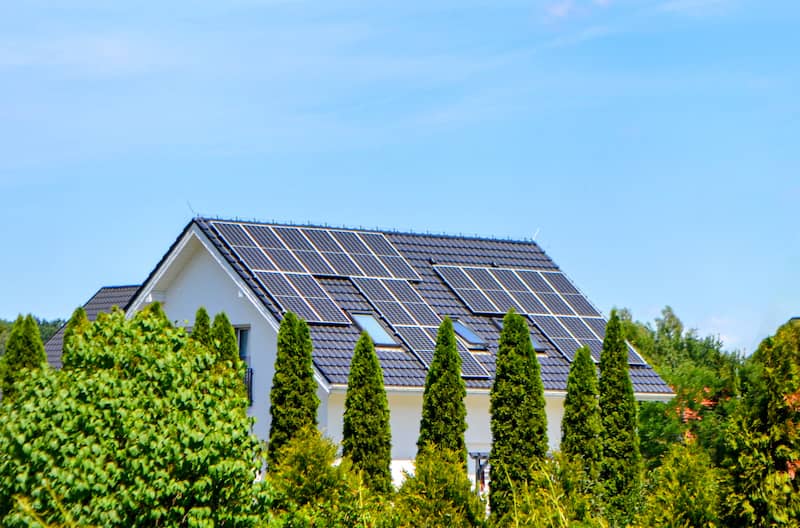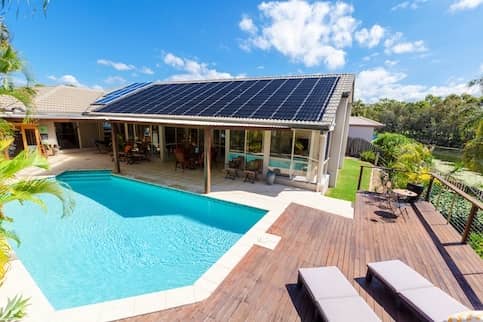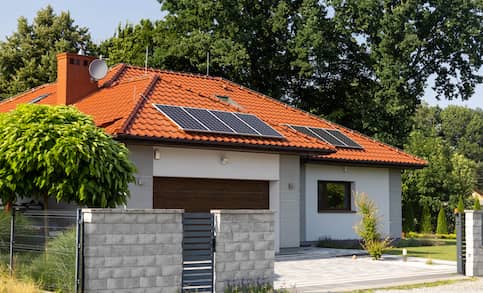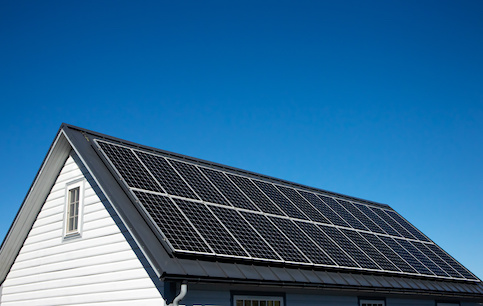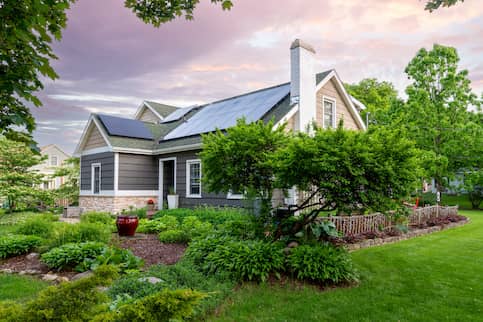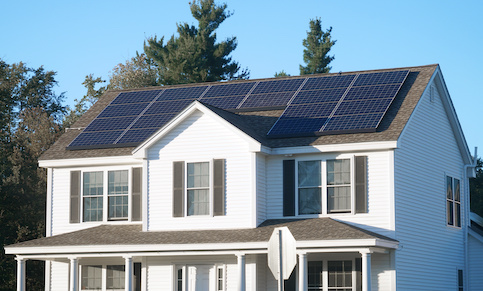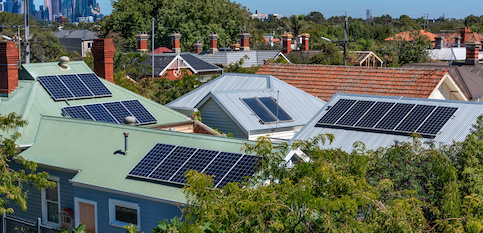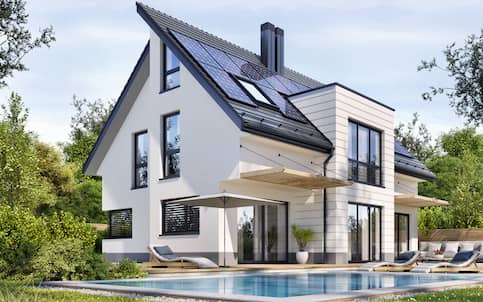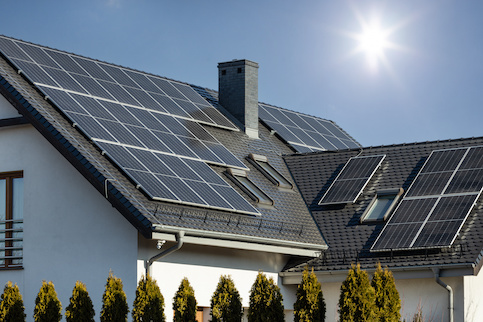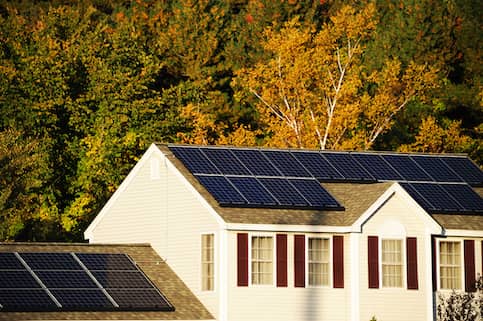If you’re thinking of going green with the help of solar panels, the upfront costs of purchasing a system might make you hesitate. Leasing solar panels is an option that removes the major upfront costs involved in making the switch. But purchasing the system, whether outright or with a loan, often leads to more energy savings in the long term.
Let’s compare the process and benefits of buying vs. leasing solar panels so you can decide which option is right for you.
Find A Mortgage Today and Lock In Your Rate!
Get matched with a lender that will work for your financial situation.
Why Convert To Solar?
There are many reasons to make the switch to solar power. Of course, the stand-out benefit is that you’ll be able to reduce the carbon footprint and environmental impact of your household’s energy needs. But other reasons to convert to solar include savings on energy costs, a better home resale value, and minimal maintenance costs.
If you want to reap the rewards of solar energy, installing solar panels is an essential step to converting your household. However, the process is an expensive undertaking. According to the Solar Energy Industries Association, it costs around $20,000 to install a solar panel system on a household with average energy usage.
See What You Qualify For
Buy A Home
Discover mortgage options that fit your unique financial needs.

Refinance
Refinance your mortgage to have more money for what matters.
Tap Into Equity
Use your home’s equity and unlock cash to achieve your goals.
How Does Leasing Solar Panels Work?
When you lease solar panels, you won’t have to shell out thousands to convert your household to solar energy. Instead, a third party will install the equipment. After installation, you’ll pay a monthly or annual lease payment for the use of the panels. Importantly, the third party retains ownership of the panels and is responsible for maintaining the unit throughout your lease.
Although the third party owns the panels, you’ll get to reap the rewards of the panels in the form of lower utility bills and a reduced carbon footprint. The cost to lease solar panels varies. But in general, you can expect to pay somewhere between $50 – $250 per month.
Are There Alternatives To Solar Panel Leasing?
If you aren’t interested in allowing a third party to take over your roof with solar panels, there are other options out there. Here’s a closer look at some of the alternatives.
Solar Power Purchase Agreement
A solar power purchase agreement differs from a lease. In this situation, you will allow a third party to install solar panels that they own on your property. Once installed, you agree to purchase the solar energy produced by the panels for a set period of time.
As a homeowner, you won’t face massive upfront costs. But on average, you’ll likely pay around $50 or less per MWh. Although this arrangement feels similar to a lease, there are some moving parts of this kind of negotiation.
Buying Solar Panels
Last but not least, you have the option to purchase solar panels for your home. Through this option, you’ll own the panels outright. Ownership means you’ll have complete control over the panels and enjoy the full benefit of the energy produced without a lease agreement cutting into your savings.
Although purchasing solar panels comes with significantly higher upfront costs, you’ll likely reap more rewards over the long term. For example, you’ll likely be able to recoup the costs of going solar faster by tapping into greater energy savings.
Plus, those that purchase their solar panels are eligible for government tax credits, which can lead to thousands of dollars saved. If you want to purchase the panels, here are two ways to make that happen.
Cash
As a homeowner with significant cash reserves, you may be able to cover the entire cost of going solar upfront. If you can cover the roughly $20,000 purchase, then you can avoid paying any interest charges on the purchase.
When the panels are installed on your home, you can start to recoup the costs through your energy savings.
Financing
If you cannot pay for your solar panels outright, financing is an option for many homeowners. For homeowners with a significant amount of equity in their homes, a home equity loan or cash-out refinance might be an appropriate way to get your hands on the funds. Another option is to take out a solar-specific loan.
Regardless of the loan type you choose to pursue, take the time to shop around for the best offer. A little bit of shopping could help you save thousands on interest payments.
What Are The Pros And Cons Of Leasing Solar Panels?
Every decision pertaining to the environment or your finances has some advantages and disadvantages. Here’s what to keep in mind about leasing solar panels.
Advantages
Let’s start by exploring the advantages of solar panels.
Lower Upfront Costs
As a homeowner, the ability to go green with lower upfront costs is a major advantage. Depending on your situation, you can get solar panels installed on your home for little or no money down. Once the panels are installed, your utility costs should decrease.
Benefits To The Environment
When you convert your household to solar energy, you’ll reduce your carbon footprint. With the rising importance of green energy, you can commit to the trend without forking over too much money upfront.
No Maintenance Responsibilities
Since you are leasing the panels, the third party company will remain the owner of the panels. The maintenance responsibilities fall firmly on the shoulders of the third party. With that, you won’t have to worry about any unexpected maintenance costs along the way.
Reduced Energy Bills
Whether you’re leasing or buying, converting to solar energy should decrease your energy costs. Even with a lease in place, your utility bills should decline due to the electricity produced by the solar panels.
Disadvantages
Leasing solar panels come with plenty of benefits. But there are also some drawbacks to consider.
Problems When Selling The Home
Solar panels often add value to a home. However, involving a third party in a major real estate transaction can make things unnecessarily complicated. Plus, the potential buyers might not like the terms of the existing lease.
If the lease cannot be transferred, then you may have to pay a significant amount of money to break the lease.
Ineligible For Tax Credits, Rebates And Other Incentives
Government incentives are plentiful for homeowners switching to solar energy. But if you are leasing the solar panels, you won’t qualify for the government incentives offered to those that purchase the solar panels.
Make sure to look into any incentives for your area when weighing the cost of buying versus leasing solar panels. In some cases, the incentives will make purchasing the panels affordable enough to fit into your budget.
Limited Energy Savings Compared To Purchased Solar Panels
Although your traditional energy consumption will decline, the cost of your solar panel lease will limit your true savings. Any savings created by the solar panel’s energy production will be eaten into by the lease costs.
In contrast, homeowners that purchase solar panels will be able to reap all of the financial rewards of green energy without a lease cutting into their returns.
Leasing Vs. Buying Solar Panels: Which Is Better?
When weighing the choice between leasing or buying solar panels, the right option comes down to your financial situation and future goals.
For those with the resources required, purchasing solar panels is often the more efficient option. Not only will you contribute to a green energy movement, but also enjoy the most cost savings from your choice.
If you are committed to going solar for the environmental implications but don’t have the funds to purchase solar panels, then leasing them might be the right option. You’ll be able to go green without any upfront costs. However, consider your long-term plans for the home before committing to a solar panel lease that might not work for future homebuyers.
Do Solar Panels Add To My Home’s Resale Value?
Solar panels can add to the value of your home. If you purchase solar panels, one study conducted by the U.S. Department of Energy found that property value may increase by $20 for every $1 saved in annual utility bills.
However, if you are leasing solar panels, the impact on home value is less clear. In some cases, prospective home buyers are wary of existing lease agreements.
The Bottom Line: Leasing Solar Panels Are An Easy And Cost-Effective Way To Benefit The Planet
If you want to make a change in your energy consumption habits, going solar is a viable option. Although homeowners that purchase solar panels will likely reap more rewards, leasing solar panels still offers a way to benefit from reduced energy costs while helping the planet.
Find A Mortgage Today and Lock In Your Rate!
Get matched with a lender that will work for your financial situation.

Sarah Sharkey
Sarah Sharkey is a personal finance writer who enjoys diving into the details to help readers make savvy financial decisions. She’s covered mortgages, money management, insurance, budgeting and more. She lives in Florida with her husband and dog. When she's not writing, she's outside exploring the coast. You can connect with her on LinkedIn.
